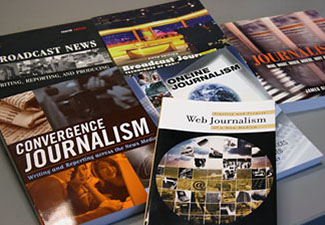Recently, MediaShift started running reports from “embeds” at various media outlets and educational institutions. This report comes from Alfred Hermida, an assistant professor at the Graduate School of Journalism at the University of British Columbia.
With students flooding back into classrooms in universities across North America, the key to getting through this demanding first week of term is simple — planning, planning and more planning. In practice, this means an August that becomes a hectic month of preparation, getting syllabi in order, ordering textbooks from the bookstore and making sure the technical gear and software is ready to go.
In the past, most courses have several expensive textbooks that are required purchases. We are taking a slightly different approach and cutting back the required textbooks. Students are told to purchase “Reporting and Writing the News” by Gerald Lanson and Mitchell Stephens, which covers the basics, as well as a collection of readings compiled as a coursepack. We also recommend the students get hold of Mark Briggs’ Journalism 2.0, available as a free download.
Because we cut back on the number of textbooks, we added one more required item — a good quality digital audio recorder. Taking the advice of online journalism professor Mindy McAdams, we recommended the Zoom H2, an affordable option for students. In any case, most students end up buying a digital recorder for interviews so they should get good use out of the device, even if they don’t use it for multimedia reporting.

The decision on textbooks also came about after students griped about having to buy expensive books that they felt had little relevance to their journalism studies. Our students are not alone in feeling like this. In a video by Professor Michael Wesch in collaboration with 200 of his students at Kansas State University called A Vision of Students Today, a student holds up a piece of paper that reads: “I will buy 100 dollar textbooks that I will never open.”
Teaching Millennial Students
There is clearly a place for books in a university course, but as instructors, we have a duty to be aware of the concerns of students, captured eloquently in Wesch’s video. These young people have grown up with choices and advantages all their lives and so they expect and demand the world on their own terms. They have also grown up in a world where technology and multi-tasking are a way of life, often learning through the trial and error process of computer games.
Knowing the cultural context for our students can make us better educators. Over the summer, we took a look at our curriculum to see where we could better serve the students, bringing in an educational expert to offer an outside perspective. We scrutinized our iJournalism program to see how we could provide a better learning experience.
As a result, we are going into the new academic year with a syllabus that builds in more experiential activities, where students learn through in-class exercises and field reporting coursework. We have provided more opportunities for teamwork on assignments, as students say they enjoy working together. And we have looked at ways of tailoring the program to each student’s individual needs, allowing them the freedom to pursue personal interests within the framework of the overall program. On one of the end-of-term assignments, students can decide whether they work on a print, television, radio or online piece — either by themselves or in teams.

This is all a work in progress. Every new academic year provides new opportunities to learn and improve. University is not just a learning environment for students, but also for professors. No doubt, we will learn something during the first, and subsequent weeks, of the year. Now it’s time to get back to sorting out those last-minute details.
Alfred Hermida is an online news pioneer and journalism educator. He is an assistant professor at the Graduate School of Journalism, the University of British Columbia, where he leads the integrated journalism program. He was a founding news editor of the BBC News website. He blogs at Reportr.net.
Photo of Zoom by Derek K. Miller via Flickr.


FEWER textbooks — not LESS textbooks
Good food for thought, and action. But I hope Hermida appreciates the luxury of textbook ordering in August. Many places, bookstores still want all summer to line things up, and administrators start demanding book lists in May.
It’s good to see journalist school is catching up with the times!
Younger students understand the power of the online media and are right in requesting that school doesn’t condemn them to pay for expensive books when other distribution methods might also work fine.
Excellent article, by the way.
Fewer textbooks, its good to see modern technology being used to advance learning. But you have to fear for languages the way things get shortened. Cell phone texting is an example of this. Good article by the way.
Traverse City Webdesign